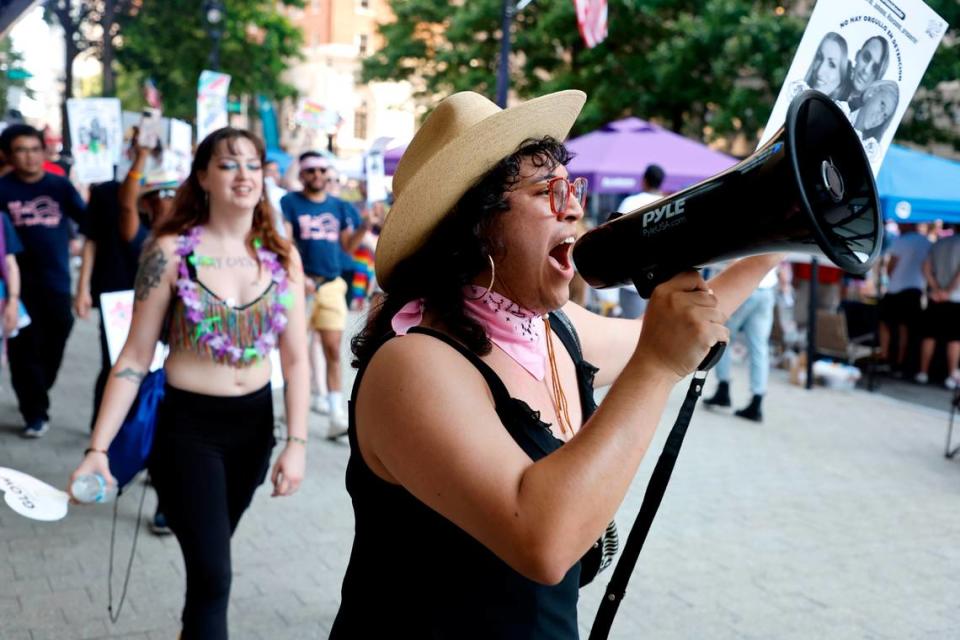During Pride, advocates for NC immigrants bring transgender rights into spotlight
About two dozen people gathered at Bicentennial Mall in downtown Raleigh Saturday, most wearing blue T-shirts with the words “end trans detention” printed in light pink.
Music from the main stage at the Pride festival on nearby Fayetteville Street faintly played in the background at about 5 p.m. as they geared up to march and chant there.
The group was made up of transgender and queer Latinos, plus some allies, from across North Carolina. Many were members and leaders of immigrants’ rights groups, like Asheboro Latinx Services, Siembra NC in Greensboro, El Pueblo, Inc. in Raleigh, and the national group Familia: Trans Queer Liberation Movement.
They were protesting the effects of potential state legislation on transgender people and the conditions transgender immigrants face in detention.
Anti-LGBT legislation
At the center of Saturday’s demonstration was House Bill 755, also known as the Parents’ Bill of Rights.
The bill in the state legislature would ban teaching about gender or sexuality in early elementary school grades, and could force school employees to out LGBTQ students to their parents, The News & Observer previously reported.
“This bill is dangerous to our LGBT youth given that suicide rates among queer and trans youth is a a record high,” said Sol Jiménez Palacios of Durham, an organizer with Familia. “The Trevor Project found that LGBTQ youth suicide rates are four times higher than their peers, so it’s clear than bills like HB 755 will harm trans and queer youth.”

This month, Speaker Tim Moore said the controversial bill might not be taken up by the North Carolina House in the remaining few weeks of the legislative session. Democratic Gov. Roy Cooper is expected to veto the Republican-sponsored bill if it were to make it to his desk.
But it is still upsetting that the bill was even introduced, said Tania Jiménez, director of Asheboro Latinx Services in Randolph County. She said anti-LGBTQ bills like HB 755 are a setback for the progress made since House Bill 2 was repealed.
“We’re having to fight for our rights yet again,” she said in an interview in Spanish, her native language, which was later translated.
Jiménez left “her beloved state of North Carolina” shortly after the state legislature passed HB2 in 2016. Also known as the “bathroom bill,” HB2 aimed to stop transgender people from using bathrooms corresponding to the gender with which they identify.
This meant that as a transgender woman, Jiménez would have been forced to use a men’s bathroom in schools and other government buildings.
“I decided to move to California,” she said in an interview in Spanish, her native language, with The N&O. “But, there, I learned so much about LGBTQ rights and brought all of that knowledge back with me to North Carolina.”
HB2 was mostly repealed in 2017, with a portion expiring in 2020.
The worst part about the new bill, Jiménez said, is how it would affect some of her own loved ones.
“I have nephews and nieces (in North Carolina schools) who are proud to have a transgender aunt,” Jiménez said. “They wouldn’t be able to say, speak or comment about a fun weekend they might’ve had with their aunt because she’s a transgender woman. That makes me so sad!”
Republicans have maintained that classroom discussion of LGBTQ issues would be unaffected by the bill, which would target curriculum. GOP supporters have said that issues of sexuality and gender identity are not appropriate for instruction in lower elementary school grades.
Transgender rights
In addition to HB 755, the group wants to make people aware of the conditions transgender immigrants face while in custody of U.S. Immigration and Customs Enforcement (ICE).
They chanted the names of three transgender immigrant women who have died while or shortly after being in ICE custody during Saturday’s protest. Victoria Arellano died in 2007, Roxsana Hernandez in 2018 and Johana Medina in 2019. All three died from complications from HIV.
“They were Latin American immigrants who sought a better and safer future here in the United States,” said Jiménez Palacios, who is transgender and uses they/them pronouns. “They were imprisoned by the so-called justice system and were refused life-saving care.”
When news broke Friday about the Supreme Court’s decision to overturn Roe v. Wade, the 1973 court ruling that federally protected a person’s right to an abortion, the group decided to also march in solidarity with people affected by the ruling.
For Jiménez Palacios, abortion and transgender rights go hand-in-hand.
“The movement against abortion is part of the larger attack (to take) control over all of our bodies,” they said. “We cannot let the Supreme Court steamroll the majority of us who demand bodily autonomy.”
